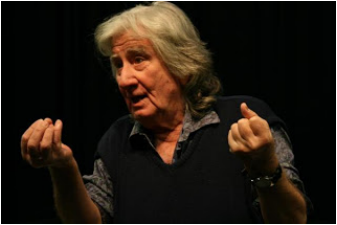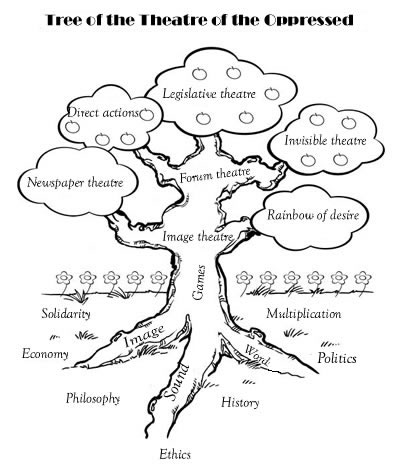Who was Augusto Boal?
Augusto Boal was born and raised in Rio de Janeiro. He was a Brazilian theatre director, writer and politician. He studied drama and chemistry at Colombia University and between 1950 and 1960 developed a new form of acting , O Teatro do Oprimido (“Theatre of the Opresssed”), which soon became famous all over Latin America and later in Europe. Boal wanted to contribute to diminishing injustice and defend Human Rights. Boal believed that the human was a self-contained theatre, actor and spectator in one. Because we can observe ourselves in action, we can amend, adjust and alter our actions to have different impact and to change our world.
Augusto Boal was born and raised in Rio de Janeiro. He was a Brazilian theatre director, writer and politician. He studied drama and chemistry at Colombia University and between 1950 and 1960 developed a new form of acting , O Teatro do Oprimido (“Theatre of the Opresssed”), which soon became famous all over Latin America and later in Europe. Boal wanted to contribute to diminishing injustice and defend Human Rights. Boal believed that the human was a self-contained theatre, actor and spectator in one. Because we can observe ourselves in action, we can amend, adjust and alter our actions to have different impact and to change our world.
What is the Theatre of the Oppressed?
The Theater of the Oppressed, established in the early 1970s by Brazilian director and Workers' Party (PT) activist Augusto Boal, is a participatory theater that fosters democratic and cooperative forms of interaction among participants. Theater is emphasized not as a spectacle but rather as a language accessible to all. More specifically, it is a rehearsal theater designed for people who want to learn ways of fighting back against oppression in their daily lives. Through Theatre of the Oppressed we can better understand ourselves, our communities and our world.
The Theater of the Oppressed, established in the early 1970s by Brazilian director and Workers' Party (PT) activist Augusto Boal, is a participatory theater that fosters democratic and cooperative forms of interaction among participants. Theater is emphasized not as a spectacle but rather as a language accessible to all. More specifically, it is a rehearsal theater designed for people who want to learn ways of fighting back against oppression in their daily lives. Through Theatre of the Oppressed we can better understand ourselves, our communities and our world.
Short biography of Augusto Boal
-Augusto Boal was born in 1931 and raised in Rio de Janeiro.
-Boal went to New York, where he studied at the School of Dramatic Arts at Columbia University. New York was attractive to him because he had an opportunity to study playwriting with drama critic, historian and artist-producer John Gassner.
-Boal returned to Brazil in 1955 and was quickly hired by Jose Renato, artistic director of the Arena Theatre in São Paulo. His work at the Arena Theatre led to his experimentation with new forms of theatre that would have an extraordinary impact on traditional practice.
-Boal's description of Arena's activities during his time there demarcates four theatrical phases. These are referred to as ' realist', 'beginning 1956; 'photographic', from 1958; 'nationalisation of the classics', from 1962; and 'musicals', from 1964.
-A new military regime started in Brazil in 1964 with a coup d'état supported by the Brazilian elite, the church and the middle class, as well as by the United States (in fear of communism). Boal’s teachings were controversial, and as a cultural activist he was seen as a threat by the Brazilian military regime.
-In 1971 Boal was kidnapped off the street, arrested, tortured, and eventually exiled to Argentina, where he stayed for 5 years.
-Boal published two books:Torquemada (1971) and his much acclaimed Theater of Oppressed (1973).
-Boal created the first International Festival for the Theatre of Oppressed in 1981.
-After the fall of the military dictatorship Boal returned to Brazil after more than 20 years of exile in 1986.
-He established a major Center for the Theater fo the Oppressed in Rio de Janeiro (CTO Rio), whose objective was to study, discuss and express issues concerning citizenship, culture and various forms of oppression using theatrical language.
-Boal's work in the CTO made way for the approval of a new law that protects crime victims and witnesses in Brazil.
-After having worked to transform spectator into author in Theater of the Oppressed, he became a city councilor. His term ended in 1996, but he continued performing legislative theater acts with different groups in Brasilia.
-In 2008 Augusto Boal was nominated for the Nobel Peace Prize, and in March of 2009 he received the title of "World Theater Ambassador" from the UNESCO.
Influences
Most of Augusto Boal’s techniques were created after he realized the limitations of didactic politically motivated theatre in the poor areas where he worked. He found that his attempts to inspire the people living in poor or 'slum' areas to rise up against racial and class inequality were inhibited by his own racial and class background, since he was white and comparatively financially comfortable. His new techniques allowed the idea of rebellion and the impetus for change to come from within the target group. Much of his early work and teaching was inspired by Maxist philosophy, although through his career he had not been restricted by this and much of his work now falls within the boundaries of a centre left ideology.
Death
Augusto Boal died May 2, 2009 at age 78 in Rio de Janeiro. He died of respiratory failure after a long battle against leukemia. Critic Yan-Michlaski claims Augusto Boal is the most known and respected Brazilian "theater man" abroad.
-Augusto Boal was born in 1931 and raised in Rio de Janeiro.
-Boal went to New York, where he studied at the School of Dramatic Arts at Columbia University. New York was attractive to him because he had an opportunity to study playwriting with drama critic, historian and artist-producer John Gassner.
-Boal returned to Brazil in 1955 and was quickly hired by Jose Renato, artistic director of the Arena Theatre in São Paulo. His work at the Arena Theatre led to his experimentation with new forms of theatre that would have an extraordinary impact on traditional practice.
-Boal's description of Arena's activities during his time there demarcates four theatrical phases. These are referred to as ' realist', 'beginning 1956; 'photographic', from 1958; 'nationalisation of the classics', from 1962; and 'musicals', from 1964.
-A new military regime started in Brazil in 1964 with a coup d'état supported by the Brazilian elite, the church and the middle class, as well as by the United States (in fear of communism). Boal’s teachings were controversial, and as a cultural activist he was seen as a threat by the Brazilian military regime.
-In 1971 Boal was kidnapped off the street, arrested, tortured, and eventually exiled to Argentina, where he stayed for 5 years.
-Boal published two books:Torquemada (1971) and his much acclaimed Theater of Oppressed (1973).
-Boal created the first International Festival for the Theatre of Oppressed in 1981.
-After the fall of the military dictatorship Boal returned to Brazil after more than 20 years of exile in 1986.
-He established a major Center for the Theater fo the Oppressed in Rio de Janeiro (CTO Rio), whose objective was to study, discuss and express issues concerning citizenship, culture and various forms of oppression using theatrical language.
-Boal's work in the CTO made way for the approval of a new law that protects crime victims and witnesses in Brazil.
-After having worked to transform spectator into author in Theater of the Oppressed, he became a city councilor. His term ended in 1996, but he continued performing legislative theater acts with different groups in Brasilia.
-In 2008 Augusto Boal was nominated for the Nobel Peace Prize, and in March of 2009 he received the title of "World Theater Ambassador" from the UNESCO.
Influences
Most of Augusto Boal’s techniques were created after he realized the limitations of didactic politically motivated theatre in the poor areas where he worked. He found that his attempts to inspire the people living in poor or 'slum' areas to rise up against racial and class inequality were inhibited by his own racial and class background, since he was white and comparatively financially comfortable. His new techniques allowed the idea of rebellion and the impetus for change to come from within the target group. Much of his early work and teaching was inspired by Maxist philosophy, although through his career he had not been restricted by this and much of his work now falls within the boundaries of a centre left ideology.
Death
Augusto Boal died May 2, 2009 at age 78 in Rio de Janeiro. He died of respiratory failure after a long battle against leukemia. Critic Yan-Michlaski claims Augusto Boal is the most known and respected Brazilian "theater man" abroad.


